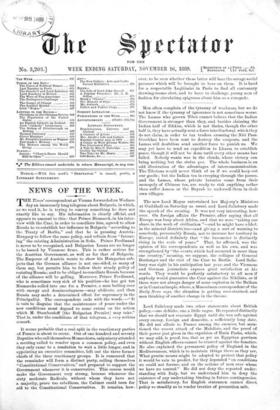Lord Salisbury made two other statements about British policy,—one definite,
one a little vague. He repeated distinctly that we should not evacuate Egypt until she was safe against every enemy, foreign and domestic, a sufficiently long date. He did not allude to France among the enemies, but men- tioned the recent attack of the Mahdists, and the proof of their power just given in the expulsion of Emin Pasha, which, we may add, is proof, too, that as yet an Egyptian garrison without English officers cannot be trusted against the fanatics. He also explained the permanent policy of England in the Mediterranean, which is to maintain things there as they are. What preeise means might be adopted to protect that policy it would be vain to predict, for they depended "on conditions we could not foresee, and on the actions of men over whom we have no control." He did not deny the reported under- standing with Italy, but we understand him to deny the existence of any undertaking binding in future contingencies. That is satisfactory, for English statesmen cannot direct policy so steadily as to render treaties of precaution safe.


















































